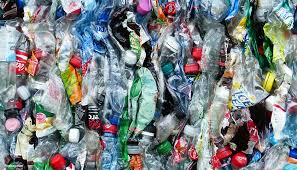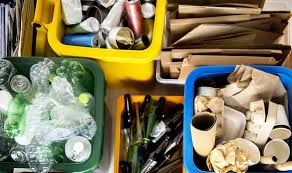Recycling of wastes is one of the methods of disposing wastes in waste management practice. Recycling refers to the re-use of waste materials. Recycling is a method of processing used materials so as to convert them into new products.
Recycling starts with the collection of the waste materials, separation and clean- up of the wastes. The collection of wastes vary from place to place and it also depends on the general composition of the wastes.
The collection of wastes may be carried out separately from general waste or sorted out directly from mixed wastes. Generally, the main methods of waste collection are: Drop-off centres, Buy-back centres and Curbside collection.
The recycling process involves passing the cleaned waste materials through a system that enables the material to be re-used.
Read Also: Complete Steps in Glass Recycling Guide
Guide to Recycling of Wastes
Wastes that are commonly recycled, include:
- Different types of glass bottles and jars.
- Paper products such as newspapers, magazines, paperboard cartons, cardboards, corrugated fiberboard boxes, etc.
- Metal such as beverage cans, aerosol cans, food cans, aluminum, copper wire, zinc, lead, metal furnishings or equipment’s, etc.
- Plastic materials especially thermoplastics the easiest to recycle because they melt when heated and can be remolded.
- Textile materials.
- Electronic materials such as computers and electronic equipment.
- Energy from wastes can be harnessed by converting them directly to fuel through combustion or by processing into another type of fuel or source of fuel.
Welcome to the enlightening realm of waste recycling, a process that breathes new life into discarded materials, promoting both environmental conservation and responsible resource management.
At its core, recycling is a systematic approach to diverting waste from landfills by harnessing the inherent value of various materials. Think of it as a circular economy, where items like plastics, metals, glass, and paper are carefully collected, sorted, and processed to be reincarnated into new products.
The first act in this recycling narrative is collection. Recycling programs, often initiated by local governments or private entities, encourage individuals to separate recyclable items from general waste at the source. This simple yet crucial step sets the stage for the entire recycling process.
Once collected, materials find their way to specialized facilities where they undergo a meticulous sorting process. Here, advanced technologies and skilled personnel work hand in hand to categorize items based on material type.
Magnets may separate ferrous metals, while optical scanners identify and sort plastics based on resin codes. This precision ensures that each material stream is as pure as possible, laying the foundation for high-quality recycled products.
Next comes the transformation phase. Materials are cleaned, shredded, and processed into raw materials ready for reincarnation. Plastics, for instance, can be melted and molded into new containers, while paper and cardboard can be pulped and reformed into fresh sheets.
This step not only conserves resources but also mitigates the environmental impact associated with extracting and processing virgin materials.
What’s truly remarkable about recycling is its ripple effect. By diverting waste from landfills, recycling reduces the burden on our disposal sites, curbing pollution and conserving valuable land resources.
Additionally, it lessens the demand for extracting raw materials, thereby lowering energy consumption and minimizing the ecological footprint of manufacturing processes.
Education plays a pivotal role in this recycling saga. As individuals gain awareness about the importance of recycling, they become active participants in the sustainable loop.
Schools, community organizations, and businesses all contribute to the educational outreach, fostering a culture of environmental stewardship.
In essence, recycling is not just a waste management strategy; it’s a holistic approach to creating a more sustainable and resilient society.
Additionally, embracing the principles of reduce, reuse, and recycle, we not only extend the life of materials but also contribute to a healthier planet for generations to come.
Therefore, let’s continue this educational journey together, turning knowledge into positive action for a greener and more sustainable future.
Biological Reprocessing

Biological composting and digestion processes are used to recycle organic wastes such as plant materials, food scraps, etc. The biological decomposition is used in the management of organic wastes by controlling and accelerating the natural process of decomposing organic materials.
The biological method of decomposition of organic wastes is either aerobic or anaerobic.
Read Also: Advantages of Waste Recycling
Advantages of Recycling of Wastes
There are numerous advantages that proper recycling of wastes brings to our environment and society. Some of the main advantages of recycling of wastes include;
- New products are obtained.
- Wastage of potentially useful materials is prevented.
- Volume of waste materials is reduced.
- Air and water pollution is reduced.
- Provides new sources of fuel.
- Saves energy.
- Saves money.
In the symphony of sustainability, recycling takes center stage as a powerful conductor, orchestrating positive changes for our planet. As an expert in the industry and a devoted advocate for environmental well-being, let me explain some of the main advantages of proper waste recycling in details below;
1. Conservation of Resources: Recycling acts as a guardian of our Earth’s precious resources. By reusing materials like paper, glass, and metals, we reduce the need for extracting new raw materials from our ecosystems. This not only conserves valuable resources but also helps maintain the delicate balance of our ecosystems.
2. Energy Efficiency: Picture recycling as a superhero swooping in to save the day when it comes to energy conservation. Crafting products from recycled materials often requires less energy compared to manufacturing from scratch. This translates into reduced carbon emissions, contributing to a healthier, more sustainable environment.
3. Waste Reduction and Landfill Diversion: Recycling is the antidote to the ever-growing menace of landfills. By diverting waste from landfills, we mitigate the environmental hazards associated with waste disposal. Less waste in landfills means fewer harmful chemicals leaching into the soil and water, fostering cleaner and healthier surroundings.
4. Economic Benefits: Beyond its environmental impact, recycling offers a plethora of economic advantages. The recycling industry generates jobs, from collection and processing to manufacturing recycled products. This not only boosts local economies but also creates a ripple effect of positive financial implications.
5. Pollution Mitigation: Recycling is akin to an environmental superhero, combating pollution on multiple fronts. By reusing materials, we diminish the need for incineration, which releases harmful pollutants into the air. Furthermore, recycling reduces the demand for new manufacturing processes that often contribute to air and water pollution.
6. Conservation of Biodiversity: Embracing recycling practices supports biodiversity by reducing the need for habitat destruction associated with resource extraction. Preserving natural habitats ensures that diverse ecosystems thrive, safeguarding a rich tapestry of plant and animal life for generations to come.
7. Climate Change Mitigation: Recycling plays a pivotal role in mitigating climate change. The energy savings achieved through recycling translate into fewer greenhouse gas emissions, contributing to the global effort to combat climate change and create a more sustainable future.
In conclusion, recycling of wastes is a very important method of waste management in which waste are converted into new useful products. The advantages of recycling are not merely confined to waste management; they radiate through every facet of our lives.
As a writer deeply entrenched in environmental advocacy, I encourage everyone to embrace the transformative power of recycling – a small action with monumental consequences for the health of our planet. Together, let us build a future where sustainability is not just a choice but a way of life.
Read Also: The Top Global Trends Driving the Fourth Agricultural Revolution

